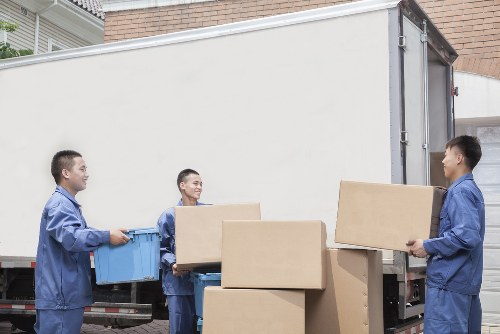Comprehensive Guide to Council Waste Collection in Virginia Water

Managing household waste is a critical aspect of maintaining a clean and healthy environment in Virginia Water. The Council Waste Collection services play a pivotal role in ensuring that residents dispose of their waste responsibly and efficiently. This article delves into the various aspects of waste collection managed by the council, providing you with all the necessary information to keep your community pristine.
Virginia Water, known for its picturesque landscapes and affluent neighborhoods, relies heavily on effective waste management systems. The council has implemented a structured approach to waste collection, catering to the diverse needs of its residents. From recycling programs to regular trash pickups, understanding these services can help you contribute to a sustainable environment.
One of the primary responsibilities of the council is to ensure that waste collection is carried out in an organized manner. This involves scheduling pickups, managing recycling stations, and educating the public about proper waste disposal practices. By adhering to these protocols, Virginia Water maintains its reputation as a clean and desirable place to live.

The council offers a variety of waste collection services tailored to the different types of waste generated by households and businesses. Regular garbage collection ensures that everyday waste is promptly removed, preventing accumulation and potential health hazards. Additionally, specialized services handle bulky items, electronic waste, and hazardous materials, ensuring that they are disposed of safely and responsibly.
Recycling is a cornerstone of the waste management strategy in Virginia Water. The council provides separate bins for recyclables, making it easier for residents to sort their waste. Materials such as paper, glass, plastic, and metal are collected and processed to reduce landfill usage and promote environmental sustainability. Participating in recycling programs not only benefits the community but also supports broader environmental conservation efforts.
Composting is another initiative encouraged by the council. By separating organic waste, residents can contribute to the production of compost, which can be used to enrich soil and support local gardening projects. This practice reduces the volume of waste sent to landfills and promotes a circular economy within the community.

Scheduling and Pickup Times
Understanding the scheduling and pickup times is essential for residents to manage their waste disposal effectively. The council has established a clear timetable, ensuring that waste is collected regularly without inconvenience to the residents.
Garbage collections typically occur once a week, while recycling pickups may be scheduled bi-weekly depending on the area. Bulk waste pickups are arranged upon request, offering flexibility to accommodate special disposal needs. It's advisable to consult the council's official website or contact their office to confirm the specific pickup schedule for your locality.
Adhering to the designated pickup days and preparing waste accordingly ensures a smooth and efficient collection process. Properly sorting recyclables and securing trash bags can prevent missed pickups and maintain the cleanliness of the neighborhood.

Recycling Programs and Guidelines
Recycling is integral to Virginia Water's waste management system. The council has implemented comprehensive recycling programs aimed at minimizing waste and promoting environmental responsibility among residents.
Residents are provided with separate bins for recyclables, which should be placed outside on the designated pickup days. It's important to rinse containers and crush cardboard boxes to optimize space and improve the efficiency of the recycling process. The council also offers guidelines on what materials can be recycled, helping to prevent contamination and ensure that recyclables are processed effectively.
Educational campaigns and workshops are conducted periodically to raise awareness about the importance of recycling and to provide tips on how to recycle correctly. By participating in these programs, residents can make a significant impact on reducing the community's environmental footprint.

Bulk and Hazardous Waste Disposal
In addition to regular waste collection, the council provides services for the disposal of bulk and hazardous waste. Large items such as furniture, appliances, and construction debris require special handling to ensure they are disposed of safely.
Residents can schedule bulk waste pickups by contacting the council, providing details about the items to be collected. This service helps prevent the accumulation of bulky waste in neighborhoods, maintaining aesthetic appeal and reducing potential hazards.
Hazardous waste, including chemicals, batteries, and electronic devices, must be disposed of with care to prevent environmental contamination. The council has designated facilities and collection points where residents can safely drop off hazardous materials. Proper disposal of these items is crucial for protecting both public health and the environment.
Local Benefits of Effective Waste Collection
Effective waste collection services bring numerous benefits to the Virginia Water community. They ensure a clean and healthy living environment, reduce the risk of disease, and enhance the overall quality of life for residents. Proper waste management also contributes to the preservation of local wildlife and natural resources, aligning with broader environmental conservation goals.
Moreover, efficient waste collection systems can lead to economic savings by reducing the need for frequent cleanups and minimizing landfill usage. This, in turn, can lower municipal costs and allow the council to allocate resources to other essential services.
Environmental Impact
Responsible waste management significantly impacts the environment by decreasing greenhouse gas emissions and conserving energy. Recycling materials saves raw resources and reduces the demand for new production, leading to lower carbon footprints. Composting organic waste enriches the soil, promoting healthier plant growth and reducing the reliance on chemical fertilizers.
By implementing comprehensive waste collection services, Virginia Water contributes to global efforts aimed at mitigating climate change and fostering sustainable living practices. Residents play a vital role in this ecosystem by adhering to waste disposal guidelines and participating in recycling initiatives.
The council's commitment to environmental stewardship is evident in their continuous efforts to improve waste management systems and introduce innovative solutions. Community engagement and collaboration are key to achieving long-term sustainability goals.
Challenges and Solutions
Despite the success of the waste collection programs, the council faces several challenges in maintaining and improving these services. Increasing waste generation due to population growth, fluctuations in recycling markets, and public compliance are some of the primary issues.
- Population Growth: As Virginia Water continues to attract new residents, the volume of waste generated increases. The council addresses this by expanding collection routes and investing in larger waste processing facilities.
- Recycling Market Fluctuations: Variability in the market demand for recyclables can affect the efficiency of recycling programs. The council mitigates this by diversifying the types of materials accepted and exploring partnerships with local businesses to create stable recycling markets.
- Public Compliance: Ensuring that residents adhere to waste disposal guidelines is an ongoing challenge. Educational campaigns, clear communication, and providing the necessary resources help improve compliance rates.
By proactively addressing these challenges, the council ensures that waste collection services remain effective and responsive to the community's needs.
Innovations in Waste Management
The council is continually exploring innovative approaches to enhance waste management in Virginia Water. Technological advancements and sustainable practices are being integrated to streamline operations and reduce environmental impact.
Smart waste collection systems utilizing sensors and data analytics are being tested to optimize pickup routes and schedules. This not only improves efficiency but also reduces fuel consumption and emissions associated with waste collection vehicles.
Additionally, initiatives such as zero-waste programs and community recycling centers are being promoted to encourage residents to take an active role in waste reduction. These forward-thinking strategies position Virginia Water as a leader in sustainable waste management.
Community Involvement
Engaging the community is essential for the success of waste collection programs. The council organizes events, workshops, and volunteer opportunities to educate and involve residents in waste management efforts.
Local schools participate in recycling drives and environmental education programs, fostering a culture of sustainability from a young age. Neighborhood clean-up events encourage collective action towards maintaining cleanliness and reducing litter.
By fostering a sense of responsibility and ownership, the council empowers residents to contribute to the community's environmental well-being.
10 Closest Areas to Virginia Water for Council Waste Collection
Virginia Water is surrounded by several neighborhoods that benefit from the council's comprehensive waste collection services. Understanding the proximity and specific features of these areas can help residents optimize their waste disposal efforts.
- Ascot: Located just 1 mile from Virginia Water, Ascot offers seamless waste collection services with additional support for high-density housing areas.
- Lyndhurst: At 2 miles away, Lyndhurst boasts efficient recycling programs tailored to its diverse community.
- Brooklands: 3 miles from Virginia Water, Brooklands benefits from bulk waste pickups and specialized hazardous waste disposal facilities.
- Weybridge: Situated 4 miles away, Weybridge has implemented community composting initiatives in collaboration with the council.
- Clandon Park: 5 miles from Virginia Water, Clandon Park emphasizes educational programs on sustainable waste management.
- Old Windsor: Located 6 miles away, Old Windsor utilizes smart waste collection technologies to enhance service efficiency.
- Whitfield: 7 miles from Virginia Water, Whitfield has dedicated recycling centers that support local businesses in waste reduction.
- Nowy Tomyśl: Although a bit farther at 8 miles away, Nowy Tomyśl participates actively in regional waste management initiatives.
- Farnham Royal: 9 miles away, Farnham Royal offers comprehensive waste collection services, including electronic waste recycling.
- Egham: Situated 10 miles from Virginia Water, Egham collaborates with the council on environmental conservation projects.
- Shepperton: At 11 miles distance, Shepperton focuses on reducing landfill usage through enhanced recycling programs.
- Staines-upon-Thames: 12 miles away, Staines-upon-Thames integrates public transportation schedules with waste collection routes for better efficiency.
- Petersham: Located 13 miles away, Petersham benefits from the council's innovative waste management solutions.
- Chertsey: 14 miles from Virginia Water, Chertsey emphasizes community involvement in waste reduction efforts.
- St. Peter's: 15 miles away, St. Peter's engages in sustainable waste practices, supported by the council's guidance.
Conclusion
Council Waste Collection in Virginia Water is a cornerstone of the community's commitment to sustainability and cleanliness. By providing comprehensive waste management services, the council ensures that residents can live in a healthy and environmentally responsible environment. Understanding the various aspects of waste collection, from scheduling and recycling programs to community involvement and innovative solutions, empowers individuals to contribute effectively to their community's well-being.
As Virginia Water continues to grow and evolve, the council remains dedicated to enhancing waste management systems, addressing challenges, and embracing new technologies. By fostering a collaborative approach with residents and neighboring areas, Virginia Water sets a benchmark for effective and sustainable waste collection practices.
Frequently Asked Questions
1. How do I schedule a bulk waste pickup in Virginia Water?
You can schedule a bulk waste pickup by contacting the council's waste management department through their official website or by calling their customer service hotline. Provide details about the items you wish to dispose of, and they will arrange a suitable pickup time.
2. What materials are accepted in the recycling program?
The recycling program accepts materials such as paper, cardboard, glass bottles and jars, plastics (excluding plastic bags), and metal cans. It's important to rinse containers and follow the council's guidelines to prevent contamination.
3. Are there any fees associated with waste collection services?
Basic waste collection services are typically covered by local council taxes. However, there may be additional fees for bulk waste pickups, hazardous waste disposal, and special recycling services. It's best to check with the council for detailed information.
4. How can I reduce the amount of waste I produce?
Reducing waste can be achieved by practicing recycling, composting organic materials, opting for reusable products, and minimizing single-use plastics. Additionally, planning purchases and avoiding excess packaging can significantly lower waste generation.
5. What should I do with electronic waste in Virginia Water?
Electronic waste should be taken to designated e-waste collection points managed by the council. These facilities ensure that electronic items are disposed of safely and recycled appropriately to prevent environmental harm.